|
|
|
Sort Order |
|
|
|
Items / Page
|
|
|
|
|
|
|
| Srl | Item |
| 1 |
ID:
121109
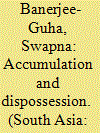

|
|
|
|
|
| Publication |
2013.
|
| Summary/Abstract |
Space and its reconstruction has emerged as one of the foremost devices of capitalist development. In this context, this paper attempts to develop a critique of the prevailing logic of 'development' in India. It argues that the contextual realities of the current exclusionist economic policy in India are defined not only by the nexus of the neo-liberal policy regime and disciplinary political authority, but also by the resistance and struggles of the dispossessed.
|
|
|
|
|
|
|
|
|
|
|
|
|
|
|
|
| 2 |
ID:
121113
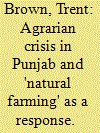

|
|
|
|
|
| Publication |
2013.
|
| Summary/Abstract |
After four and a half decades of Green Revolution agrarian development, the state of Punjab is now, according to many commentators, in a state of social, economic and ecological crisis. In this paper, I interpret this crisis through a Gramscian lens as a 'crisis of authority', in the sense that while the dominant paradigm (the Green Revolution) can no longer provide solutions to the state's most pressing social problems, there is no clear single alternative either. This situation provides a political opportunity for non-hegemonic groups to articulate various other possibilities that address fundamental questions. This paper focuses on the work of one such group, the Kheti Virasat Mission (KVM). KVM is a civil society organisation that promotes 'natural farming' as a solution to the crisis in Punjab: natural farming is a chemical-free method of farming, which relies exclusively on materials available at the local level. This paper looks at KVM's methods of intervening in the crisis situation and examines the difficulties faced at the level of implementation. It argues that KVM's successes and failures highlight the uneven capacities of different classes and social groups to effectively respond to a 'crisis of authority'.
|
|
|
|
|
|
|
|
|
|
|
|
|
|
|
|
| 3 |
ID:
121111
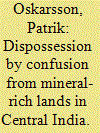

|
|
|
|
|
| Publication |
2013.
|
| Summary/Abstract |
Bauxite mineral projects in central India have in recent years generated conflicts over both the physical environment and equitable development for very vulnerable people. In one such project, a joint venture between the state government of Andhra Pradesh and a private investor, attempts are currently being made to open up land constitutionally reserved for India's Scheduled Tribes. The final outcome, though still uncertain, depends not only on the relative material resources of the opposing parties, but on a drawn-out process of contestation where the discursive resistance to tribal land dispossession has strong historical roots and many active supporters. Thus, for the project's promoters, their advantage rests on their ability to create confusion via superior access to, and control over, information, rather than relying on their direct authority.
|
|
|
|
|
|
|
|
|
|
|
|
|
|
|
|
| 4 |
ID:
121115
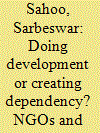

|
|
|
|
|
| Publication |
2013.
|
| Summary/Abstract |
This paper examines the role of non-government organisations (NGOs) and the implications for democratisation in India. By analysing one such organisation, this paper argues that NGOs do not always contribute positively to the democratisation process. It shows how Seva Mandir, an NGO working in the tribal areas of Rajasthan, has adopted a purely technocratic and apolitical service delivery approach and promoted a neo-liberal model of development. The unintended consequence of promoting this model has been the growth of a culture of 'organised dependency' at the grass-roots level, which has adversely affected the larger objectives of empowerment and democratisation.
|
|
|
|
|
|
|
|
|
|
|
|
|
|
|
|
| 5 |
ID:
121112
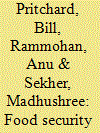

|
|
|
|
|
| Publication |
2013.
|
| Summary/Abstract |
Contemporary India possesses a food security paradox-progress in combating food insecurity is occurring at a slower pace than might be expected, given the nation's rapid economic growth. This paper provides a conceptual framework to explain this phenomenon. Drawing on the work of Amartya Sen, it uses a broadly framed analysis to conceptualise the problem in terms of the interactivity between three types of entitlement failure. Firstly, pure exchange system entitlement (abilities to obtain food from welfare programmes) has been curtailed by institutional shortcomings in pivotal programmes. Secondly, opportunities for wage-labour entitlement (abilities to obtain food from monetary incomes) have been restricted for vulnerable households because of the sequencing and geographical patterning of recent economic growth in India. Thirdly, opportunities for vulnerable households to address their needs through own-production entitlement (abilities to grow one's own food) have been curbed by land fragmentation and environmental degradation. These interactions have created vicious cycles of food insecurity for vulnerable households. Through this approach, the deeper causal roots of India's food security paradox are articulated, thus underscoring the importance of multi-pronged, holistically constructed policy agendas.
|
|
|
|
|
|
|
|
|
|
|
|
|
|
|
|
| 6 |
ID:
121117
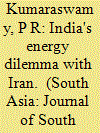

|
|
|
|
|
| Publication |
2013.
|
| Summary/Abstract |
Iran, being a major player in the hydrocarbon sector, is both an opportunity and a challenge for India. While Iran's hydrocarbons could partly address India's growing appetite for oil and natural gas and contribute to its energy security, its willingness to transform its energy ties with Iran beyond purely commercial transactions coincided with its desire to negotiate a civil nuclear deal with the US. Moreover some of the energy deals between the two countries are stuck over price disputes and technology difficulties, while others have come under international pressure and scrutiny. While international sanctions against Iran undermine India's ability to pursue its energy ties with Iran, maintaining the status quo has some economic and political advantages. Hence, India is not yet ready to abandon Iran for the US.
|
|
|
|
|
|
|
|
|
|
|
|
|
|
|
|
| 7 |
ID:
121110
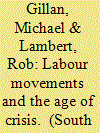

|
|
|
|
|
| Publication |
2013.
|
| Summary/Abstract |
Labour movements, in responding to global crises, are themselves confronted by 'intersecting contradictions' related to differing trade union forms and repertoires of action. In India, unions have been shaped in powerful ways by their historic articulation to state and politics. The scope and framing of union action has been somewhat limited. However, trade unions in India are also in a process of transition and are now more various in their forms, strategies and spatial relations.
|
|
|
|
|
|
|
|
|
|
|
|
|
|
|
|
| 8 |
ID:
121116
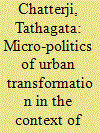

|
|
|
|
|
| Publication |
2013.
|
| Summary/Abstract |
Through a case study on Gurgaon in the state of Haryana, this article explores how local political factors, the rural-urban divide and conflicts between multiple tiers of government influenced the governance process of a globalising urban region in India. In two decades, Gurgaon was transformed from a small rural town to a global hub for the outsourcing industry. This real estate sector-driven rapid urban makeover, through conversion of peri-urban agricultural land to create production and consumption spaces for the new economy, is leading to a fragmented landscape that contains glaring inequalities. The everyday tensions and contradictions of this transitional journey, which came sharply into focus with the formation of a new municipal corporation, form the immediate backdrop of the study.
|
|
|
|
|
|
|
|
|
|
|
|
|
|
|
|
| 9 |
ID:
121114


|
|
|
|
|
| Publication |
2013.
|
| Summary/Abstract |
The already divisive politics of South Asia's trans-boundary water resources are further complicated by the rush to construct large- and medium-scale dams. While highly contested in India today, hydropower construction reflects a nexus of state and capital that discriminates against the poorest and most marginalised citizens. Alternatives to the multiple crises of water within and beyond India must look beyond state-centrism and, instead, promote multi-scalar civil society organisations and networks, which may contribute to a more sustainable and transparent South Asia in the future.
|
|
|
|
|
|
|
|
|
|
|
|
|
|
|
|
|
|
|
|
|